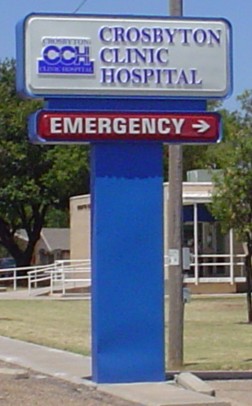
Crosbyton Clinic Hospital
Providing Quality Healthcare for our Neighbors
When you are registered at Crosbyton Clinic Hospital you will be asked to read and sign several documents. The documents include Consent to Treatment, HIPAA Privacy Notice, Advance Directive and other documents when being seen in the Emergency Room.
HIPPA - The HIPPA Privacy Notice you will need to sign is to protect your personal health information. Unless otherwise instructed Crosbyton Clinic Hospital will list your name in our Directory of Patients during your stay. This will allow you to receive visitors, telephone calls, mail and flowers. In accordance with Texas Law, and in keeping with our respect of patient's rights, any patient may request that no information be released.
Insurance Billing - Whether you have individual coverage, Medicare, and/or Medicaid, always remember to bring your insurance card(s) with you. For your convenience, the hospital will file your insurance. Many health insurance plans require pre-certification before hospital admission or treatment.
It is important to remember that you are responsible for your hospital bill, even though you have insurance coverage. When we file an insurance claim for you, we expect payment in full, no later than 45 days following treatment. If no payment has been received from your insurance carrier, if you do not respond to your insurance carrier's request for information, or we cannot determine the cause for further delays, we will look to you to pay your account. Your insurance policy is a contract between you and your insurance company, not between your insurance company and the hospital.
For those who have no insurance coverage, you will be asked to pay your account in full, unless prior arrangements are made. The hospital accepts MasterCard, Visa and Discover Card.
If you have questions or concerns about a bill you receive from Crosbyton Clinic Hospital, please call our Billing Department at (806) 675-2382 for assistance.
Patient Rights and Responsibilites
Patients have the right to:
* Become informed of his or her rights as a patient in advance of, or when discontinuing, the provision of care. The patient may appoint a representative to receive this information should he or she so desire.
* Exercise these rights without regard to sex or cultural, economic, educational or religious backgroung or the source of payment for care.
* Considerate and respectful care, provided in a safe environment, free from all forms of abuse, neglect, harassment and/or exploitation.
* Have his or her cultural, psycho-social, spiritual and personal values, beliefs and preferences respected. To assure these preferences are identified and communicated to staff, a discussion of these issues will be included during the initial nursing admission assessment.
* Access protective and advocacy services or have the services accessed on the patient's behalf.
* Appropriate assessment and management of pain.
* Remain free from seclusion or restraints of any form that are not medically necessary or are used as a means of coercion, discipline, or retaliation by staff.
* Knowledge of the name of the physician who has primary responsibility for coordinating his/her care and the names and professional relationships of other physicians and healthcare providers who will see him/her.
* Receive information from his/her physician about his/her illness, course of treatment, outcomes of care (including unanticipated outcomes), and his/her prospects for recovery in terms that he/she can understand.
* Receive as much information about any proposed treatment or procedure as he/she may need in order to give informed consent or to refuse course of treatment. Except in emergencies, this information shall include a description of the procedure, or treatment, the medically significant risks involved in the treatment, alternate courses of treatment or non-treatment and the risks involved in each and the name of the person who will carry out the procedure or treament.
* Participate in the development and implementation of his or her plan of care and actively participate in decisions regarding his/her medical care. To the extent permitted by law, this includes the right to request and/or refuse treatment.
* Formulate advance directives regarding his or her healthcare, and to have hospital staff and practitioners who provide care in the hospital comply with these directives ( to the extent provided by state laws and regulations).
* Have a family member or representative of his or her choice notified promptly of his or her admission to the hospital.
* Have his or her personal physician notified promptly of his or her admission to the emergency room.
* Full consideration of privacy concerning his/her medical care program. Case discussion, consultation, examination and treatment are confidential and should be conducted discreetly. The patient has the right to be advised as to the reason for the presence of any individual involved in his/her healthcare.
* Confidential treatment of all communications and records pertaining to his/her care and his/her stay in the hospital. His/her written permission will be obtained before his/her medical records can be made available to anyone not directly concerned with his/her care.
* Receive information in a manner that he/she understands. Communications with the patient will be provided in a manner that facilitates understanding by the patient. Written information provided will be appropriate to the age, understanding and, as appropriate, the language of the patient. As appropriate, communications specific to the vision, speech, hearing, cognitive and language-impaired patient will be appropriate to the impairment.
* Access information contained in his/her medical record within a reasonable time frame.
* Reasonable responses to any reasonable request he/she may make for service.
* Leave the hospital even against the advice of his/her physician.
* Reasonable continuity of care.
* Be advised of the hospital grievance process, should he or she wish to communicate a concern regarding the quality of the care he/she receives or if he/she feels the determined discharge date is premature. Notification of the grievance process includes: whom to contact to file a grievance, and that he/she will be provided with a written notice of the grievance determination that contains the name of the hospital contact person, the step taken on his/her behalf to investigate the grievance, the results of the grievance and the grievance completion date.
* Be informed by his/her physician or a delegate of his/her physician of the continuing healthcare requirements following his/her discharge from the hospital.
* Examine and receive an explanation of his/her bill regardless of source of payment.
* Know which hospital rules and policies apply to his/her conduct while a patient.
* Have all patient's rights apply to the person who may have legal responsibility to make decisions regarding medical care on behalf of the patient.
ALL HOSPITAL PERSONNEL, MEDICAL STAFF MEMBERS AND CONTRACTED AGENCY PERSONNEL PERFORMING PATIENT CARE SHALL OBSERVE THESE PATIENTS' RIGHTS.
Patient Responsibilities:
The care a patient receives depends partially on the patient. Therefore, in addition to these rights, a patient has certain responsibilities as well. These responsibilities should be presented to the patient in the spirit of mutual trust and respect.
* The patient has the responsibility to provide accurate and complete information conserning his/her present complaints, past illnesses, hospitalizations, medications and other matters relating to his/her health.
* The patient is responsible for reporting perceived risks in his/her care and unexpected changes in his/her condition to the responsible practitioner.
* The patient and family are responsible for asking questions about the patient's condition, treatments, procedures, clinical laboratory and other diagnostic test results.
* The patient and family are responsible for asking questions when they do not understand what they have been told about the patient's care or what they are expected to do.
* The patient and family are responsible for immediately reporting any concerns or errors they may observe.
* The patient is reponsible for following the treatment plan established by his/her physician, including the instructions of nurses and other health professionals as they carry out the physician's orders.
* The patient is responsible for his/her actions should he/she refuse treatment or not follow his/her physician's orders.
* The patient is responsible for assuring that the financial obligations of his/her hospital care are fullfilled as promptly as possible.
* The patient is responsible for following hospital policies and procedures.
* The patient is responsible for being considerate of the rights of other patients and hospital personnel.
* The patient is responsible for being respectful of his/her personal property and that of other persons in the hospital.
FOR PATIENTS
PRICING TRANSPARENCY
The Centers for Medicare and Medicaid (CMS) established guidance for hospital to make available a list of their standard charges online.
At Crosbyton Clinic Hospital, we know that health care can be an unexpected expense and that the cost of health care services can be a deciding factor for many people as they plan for care. Crosbyton Clinic Hospital supports health care pricing transparency and tools that help patients and consumers evaluate what care is best for them and any related financial costs.
Hospital charges can help patients understand what the costs might be for certain health care services; however, they don’t provide a full picture of what patients will pay. Patients’ financial liability will depend on the full course of treatment and on the type of insurance coverage they have.
We encourage all health care consumers to speak with their providers and their health plan to get a full picture of what they will pay. For our patients, we offer financial counseling for those experiencing hardship during any point throughout their care.
